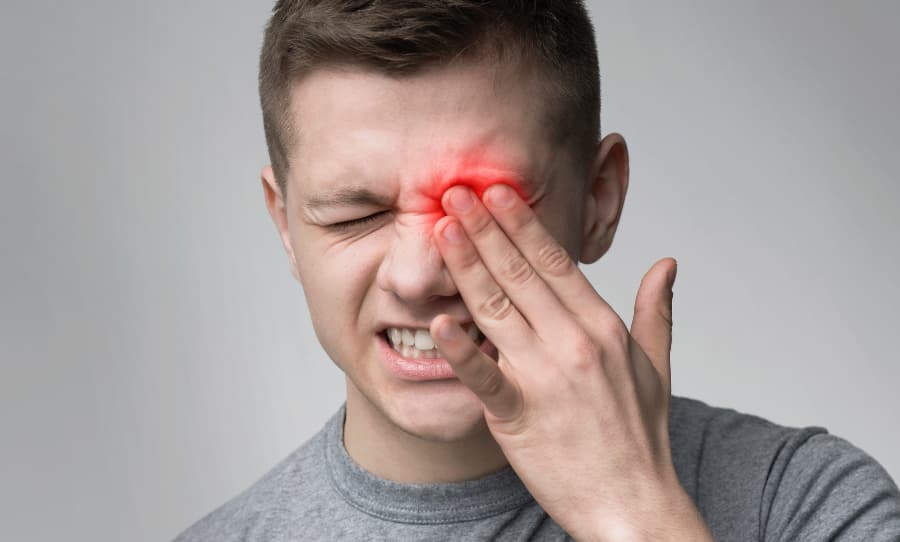How Do Concussions and Other Head Injuries Affect Vision?
Concussions and blows to the head are not always life-threatening, but these injuries can have lasting effects if not properly treated. Concussions and other brain-related injuries can lead to a host of health concerns, including vision impairment. Although blurry vision and sensitivity to light are common after a hit to the head, these symptoms often get overlooked while doctors address cognitive concerns following a head injury.
Savedoff, Ciccone & Davis, Doctors of Optometry, P.C., provides post-concussion vision therapy for patients experiencing post-trauma vision impairment along with other comprehensive vision services at our Manlius and Syracuse, NY, locations. Here, we discuss the effects a concussion or other head injury can have on vision.
What Is a Concussion and How Does it Occur?
The brain is the body’s control center, directing many of the body’s functions. Direct trauma to the head, such as a bump, blow, or jolt, causes the head and brain to move rapidly back and forth. This sudden movement causes the brain’s tissue to change shape, stretching and damaging brain cells.
During a concussion, the brain also experiences chemical and metabolic changes, making it difficult for cells to function and communicate and for the body to function as usual. In many cases, concussions and other head injuries are the result of a slip or fall-related accident or sports injury. Concussions can also occur from a sudden acceleration or deceleration of the head, commonly found in whiplash injuries.
Due to the impact and stress on the brain, many assume people who sustain a concussion experience a loss of consciousness. However, that’s very rarely the case. Most of the time, a person with a concussion never passes out. External signs of head trauma, such as bleeding, are also rare.
Understanding Concussion Symptoms
Knowing the signs and symptoms of a concussion is incredibly important because the condition doesn’t usually show up on imaging like an X-ray, CT, or MRI scan. Likewise, there aren’t any objective tests doctors can perform that definitively indicate a person has a concussion.
Instead, a qualified doctor makes a diagnosis based on physical examinations and the symptoms the patient is experiencing. The signs of a concussion range from readily apparent signs to much more nuanced symptoms. If a person shows one sign of a concussion in the aftermath of a head injury, they should seek medical attention.
The most common signs of a concussion include:
- Loss of balance
- Uncontrolled laughter or crying
- Vomiting
- Amnesia
- Delayed response times
- Glazed over eyes
- Confusion
Concussion and Your Vision
Traumatic brain injuries can be linked to temporary or lasting vision-related symptoms. Many people who’ve experienced concussions report visual problems. Some might assume this is due to problems with the eyes. While some accidents that cause a concussion can also lead to damage of the optic nerve, it’s more likely the impairment is related to a communication issue between the brain and the vision system.
Vision-related concussion symptoms include:
- Blurred vision
- Eye strain
- Trouble focusing on one object
- Difficulty reading
- Light sensitivity (photophobia)
- Problems with depth perception
- Decreased peripheral vision
- Motion sensitivity
- Difficulty following moving objects
FAQ About Concussion-Related Vision Problems
How Long Do Vision Problems Last After a Concussion?
Concussion symptoms usually subside within a couple of weeks following the injury. If vision concerns persist more than six weeks after the initial blow to the head, it’s unlikely vision will return to normal without vision therapy.
Can a Concussion Result in Permanent Vision Loss?
In some cases, a concussion can permanently change a person’s vision, especially if the cause damages the optic nerve or vision system. The healing process depends on the severity of the injury and the areas of the brain and eyes affected.
What’s the Best Treatment Option for Post-Concussion Ocular Issues?
Vision therapy is typically the recommended route for treating vision-related issues following a concussion or other injury involving the brain. This treatment option involves eye exercises under the supervision of a qualified eye doctor. These exercises are intended to strengthen visual skills and the muscles that make up the vision system. Vision therapy targets the eye muscles and regions of the brain that process visual information to help eliminate visual symptoms and redevelop normal visual function.
Find Post-Concussion Vision Care in Manlius and Syracuse, NY
People experiencing vision-related symptoms after a concussion will find compassionate care at Savedoff, Ciccone & Davis, Doctors of Optometry, P.C. Our highly skilled team addresses concussion-related vision concerns through comprehensive services, such as post-concussion therapy. Our office has extensive experience treating referrals from the SUNY Upstate Concussion Clinic, the Syracuse University Sports Medicine Department, as well as other local colleges and sports teams. For more information regarding the vision services available at our Manlius and Syracuse, NY, offices, contact us today.



